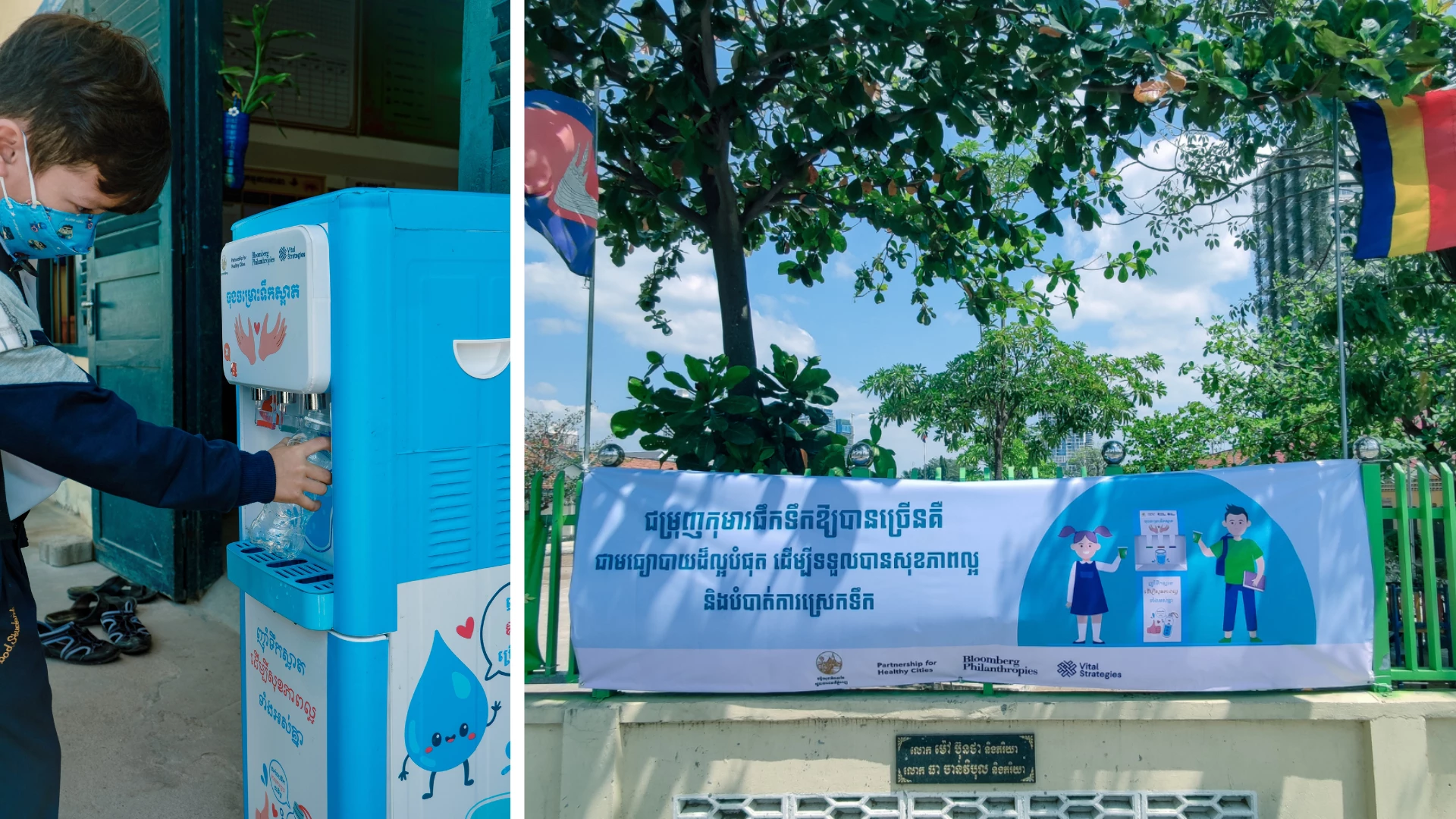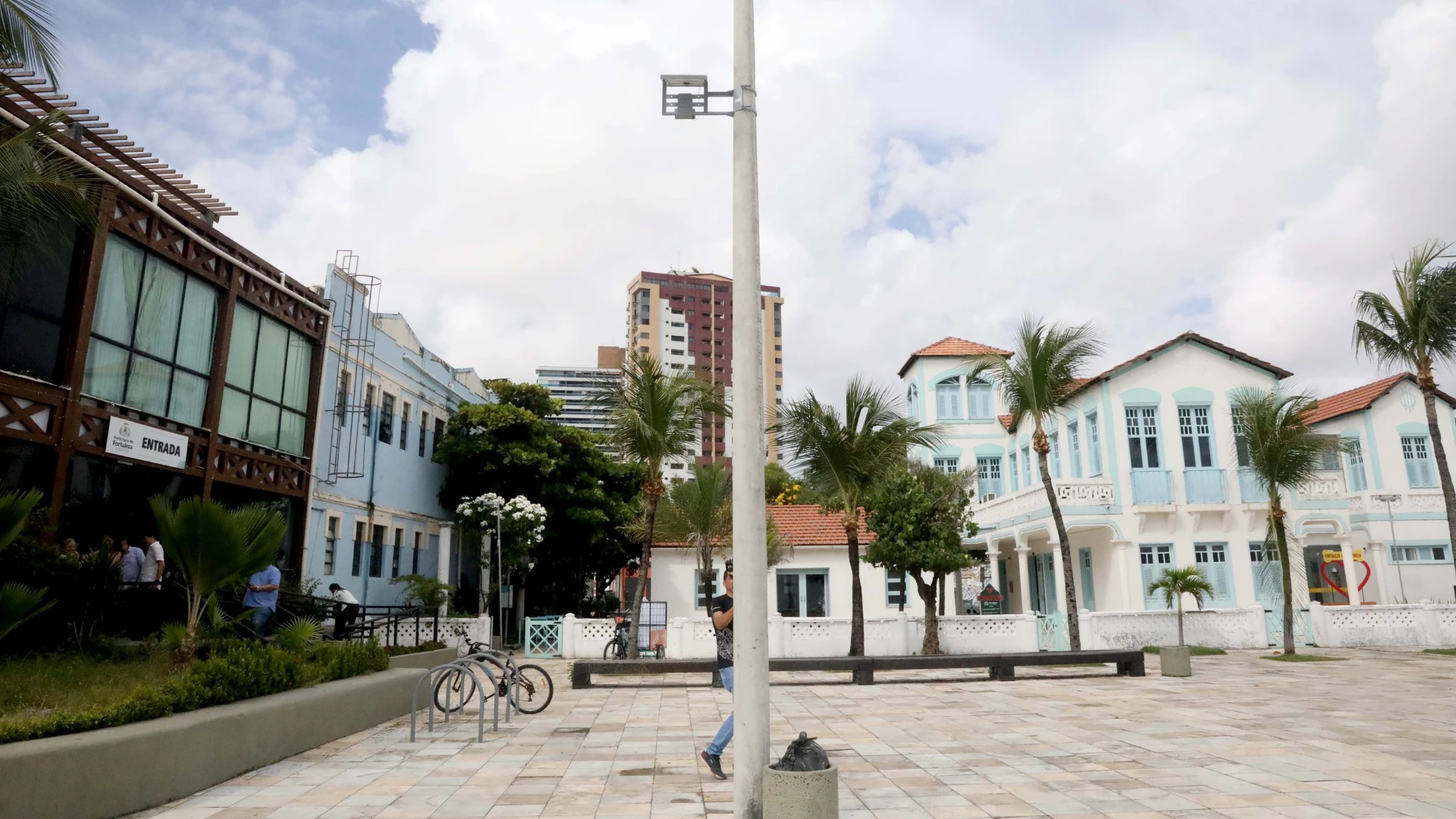4 cities leading through policy change
Read about more about urban centers preventing disease and injury through public health policy change at the local level.

As the world's urban population rapidly grows, so does the potential impact of city health policies. Embedded within the Partnership for Healthy Cities, the Policy Accelerator supports cities in designing and implementing lifesaving measures that prevent noncommunicable diseases (NCDs) and injuries.
We highlight four cities that have recently amended their laws and affirmed their commitments to building cities that protect health and safety.
Healthier Schools in Phnom Penh, Cambodia
The problem: Globally, 8 million NCD deaths are associated every year with poor diet, a crisis that’s increasing most rapidly in low- and middle-income countries. In Cambodia, consumption of sugary drinks has been on the rise. The national government issued guidelines in 2019 that prohibited the sale of unhealthy foods, sugary drinks, alcohol and tobacco products in educational institutions and provided recommendations for healthier options. However, local agencies struggled to implement the national guidelines.
The policy: In July 2023, Phnom Penh’s governor signed an order that fully implemented the national guidelines within the city. All schools in the city—more than 700—were required to create “healthier learning spaces” for roughly 360,000 students. The city was the first urban center in Cambodia to adopt the measures locally, a move supported by the city's education, health and law enforcement agencies.
From the team: “We need to shape the mindset of our future generations, our kids, our children and our citizens, for them to start adopting healthier choices from a young age.” — Her Excellency Keo Sokpisey, Vice Governor of Phnom Penh

Phnom Penh is increasing schoolchildren’s access to safe drinking water through the installation of 100 dispensers in 92 public primary schools.
Air Quality Monitoring in Fortaleza, Brazil
The problem: Air pollution is the leading environmental threat to public health globally, claiming 7 million lives annually. Young people are especially vulnerable, with exposure linked to respiratory disease, cancers and cognitive impairment. In Fortaleza, the city government knew the risks posed by air pollution but were lacking the systems needed to reliably monitor pollutants. Data can help calculate the health risks of poor air quality and inform policy solutions that save lives.
The policy: Through the Policy Accelerator, Fortaleza mandated routine air quality monitoring in 2023, along with public reporting of the data collected and the installation of low-cost sensors. There is a special focus on school zones in the first year of the policy’s implementation.
From the team: "In Fortaleza, we’re collecting air quality data in order to create innovative public policies that improve the quality of life for our residents." — Victor Macedo, Vice President, Foundation for Science, Technology and Innovation (CITINOVA)

Monitoring air pollution sources is now required for the first time, with new low-cost sensors installed outside schools and other sites.
Motorcycle Safety in Buenos Aires and Mexico City
The problem: Almost one-third of road traffic deaths worldwide involve powered two- and three-wheeled vehicles.
In Mexico City, motorcyclist fatalities increased by 134% over the past three years and serious injuries rose by 89%. The city investigated the specific causes of these increases and identified the main factors, including not wearing helmets, wearing helmets incorrectly, speeding, and riding with too many passengers.
In 2022, motorcyclist deaths in Buenos Aires accounted for almost one in every two fatalities on the road—at a time when registration of motorcycles nationwide had increased to 50% of the total number of vehicles registered. Men aged 15 to 44 years are most at risk.
The policies: Both cities have adopted new policies aimed at reducing motorcyclist fatalities and serious injuries on the road.
Mexico City’s Mobility Department amended the city’s transit regulation by increasing penalties for riders engaging in identified risky behaviors—such as helmet misuse—including the threat of having their motorcycles impounded. When worn correctly, motorcycle helmets reduce the risk of death in a road crash by about 40% and reduce the risk of brain injury by up to 74%.
In Buenos Aires, new measures include an improved motorcycle licensing process with a more rigorous driving exam, drawing on successful state-level policies in Victoria, Australia, where nearly 43% fewer drivers aged 18 to 23 years were found to have been involved in fatal or serious injury crashes following the introduction of enhanced licensing measures.
From the Buenos Aires team: “We are learning from [Mexico City]. For example, they put a lot of emphasis on creating a relationship with the community to make sure there is public support. This has been a useful lesson for us.” — Lucila Capelli, Undersecretary for Mobility Planning, City of Buenos Aires
From the Mexico City team: “In the Policy Accelerator, we've learned the importance of using data and evidence to support our policy… It's very important to know the context, the problem and the exact magnitude we face.” — Luis Flavio Lazos Murrieta, Head of Mobility Regulation, Mobility Department, Mexico City

Buenos Aires and Mexico City have both seen surges in motorcycle use since the start of the COVID-19 pandemic—along with huge increases in the number of injuries and fatalities—so they are working together on new safety strategies.
Related

Read about how six Latin America cities prioritized health and safety in 2023, as part of their work with the Partnership's Policy Accelerator program.

Athens, Greece is one of many cities around the world facing an opioid overdose crisis.

An interview with Cape Town Mayor Geordin Hill-Lewis ahead of the 2024 Partnership for Healthy Cities Summit.